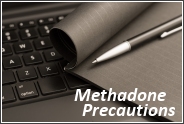 Methadone take homes (or carry outs) are awarded to clients that have demonstrated treatment progress, stability, and personal responsibility. A take home dose of methadone may be earned once a client has met a number of criteria set by each methadone clinic. Each state has its own methadone authority that provides additional guidelines regulating take home award. Consequently, take home medication awards may differ from one clinic to the next, and from one state to the next.
Methadone take homes (or carry outs) are awarded to clients that have demonstrated treatment progress, stability, and personal responsibility. A take home dose of methadone may be earned once a client has met a number of criteria set by each methadone clinic. Each state has its own methadone authority that provides additional guidelines regulating take home award. Consequently, take home medication awards may differ from one clinic to the next, and from one state to the next.
Some clinics provide an automatic take home for Sunday (often because the clinic is closed on Sunday), although a number of treatment programs have discontinued the “automatic” Sunday take home and are now open every day of the week for medication dispensing . This change resulted from a move to increase patient safety and to help ensure that take home medication was provided only to those with a good track record of program success & compliance.
It should be noted that pain management clinics and addiction treatment clinics, both of which provide their patients with methadone, are very different programs and operate with significantly different standards and oversight. Opioid addiction treatment programs are subject to much tighter regulation and require that new participants be seen face-to face everyday in order to be evaluated before they receive their methadone dose.
This is not required of pain management clinics who are able to dispense opioid pain medication (including methadone) without the same level of oversight. Consequently, much of the methadone diversion concerns making the news (including related overdoses) are the result of diversion of methadone provided by the less regulated pain management clinics.
Unfortunately, the general public have often wrongly assumed that addiction treatment clinics were at fault. While diversion of methadone does occur on occasion in both settings, methadone treatment clinics offer much more comprehensive accountability & monitoring measures than do most pain management clinics.
A majority of methadone take home recipients are very responsible with their medication. They take it exactly as prescribed, and store it safely & securely. Many patients have properly utilized their take home medication for years without incident or problems of any kind.
A number of clinics allow their patients to receive up to 13 take home doses requiring an in-person visit to the clinic on the 14th day. Some clinics provide up to a month of take home medication for patients showing long-term stability and responsible handling of their take home medication. Take homes are earned one-at-a-time at specific time intervals as clients move through phases (or levels) in the opioid treatment program.
It is important to note that take home medication is a privilege, and not a right. The award of take home medication is usually a team consensus decision based on a patient’s excellent urinalysis results, consistent attendance to & participation in treatment sessions, and evidence of psychiatric stability and good decision-making ability. If a client relapses or is having a particular problem coping, then take home medication is suspended for the client’s safety, and until the treatment team determines that the client is doing well enough to resume take homes.
 The synthetic opioid, fentanyl, has led to an increase in overdose deaths in recent years. As many as 112,000 in the last year according to NPR. As a result, some physicians are pushing to make methadone more available to those who need it.
The synthetic opioid, fentanyl, has led to an increase in overdose deaths in recent years. As many as 112,000 in the last year according to NPR. As a result, some physicians are pushing to make methadone more available to those who need it.
 Follow
Follow

 If you are currently a client in a methadone clinic, then you have most likely heard treatment staff emphasize the importance of safety with methadone and the necessity of carefully securing take home methadone doses. Methadone is a powerful medication that is tremendously helpful to recovering individuals. It is also potentially lethal in the wrong hands and consequently must be deliberately safeguarded.
If you are currently a client in a methadone clinic, then you have most likely heard treatment staff emphasize the importance of safety with methadone and the necessity of carefully securing take home methadone doses. Methadone is a powerful medication that is tremendously helpful to recovering individuals. It is also potentially lethal in the wrong hands and consequently must be deliberately safeguarded. Methadone “take home” medication (also referred to as “take outs”) is a true convenience for those enrolled in a methadone clinic. Typically, clients who demonstrate that they are drug free and progressing in their substance abuse treatment can earn the privilege to receive take home medication.
Methadone “take home” medication (also referred to as “take outs”) is a true convenience for those enrolled in a methadone clinic. Typically, clients who demonstrate that they are drug free and progressing in their substance abuse treatment can earn the privilege to receive take home medication. Methadone take homes (or carry outs) are awarded to clients that have demonstrated treatment progress, stability, and personal responsibility. A take home dose of methadone may be earned once a client has met a number of criteria set by each methadone clinic. Each state has its own methadone authority that provides additional guidelines regulating take home award. Consequently, take home medication awards may differ from one clinic to the next, and from one state to the next.
Methadone take homes (or carry outs) are awarded to clients that have demonstrated treatment progress, stability, and personal responsibility. A take home dose of methadone may be earned once a client has met a number of criteria set by each methadone clinic. Each state has its own methadone authority that provides additional guidelines regulating take home award. Consequently, take home medication awards may differ from one clinic to the next, and from one state to the next.


